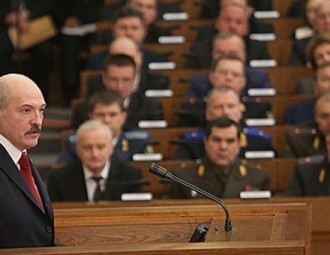Lukashenka will keep the economic model with minor reforms in the hope of environment to change

Under the pressure of external factors and reduced state resources, the state will be forced to carry out some reforms of the existing socio-economic model, while preserving the monopoly on power.
The Annual Address of the president was record short, low-key and flat, without conventional emotional deviations from the text. Independent media have marked apparent fatigue of President Lukashenka during his speech. Some analysts have compared his speech to that of the USSR leaders during stagnation.
Apparently, the Belarusian authorities still do not have the vision for a long-term development strategy and have no answers to questions, which concern the population about the way out of the economic recession. The president said, that this year would be crucial for the economic situation to improve.
The government is supposed to submit to the president a draft outline of the development programme for the next five years by mid April. As a rule, the president refers to this document during his speech at the All-Belarusian People’s Assembly. However, the date for the Assembly has not yet been identified, which could mean that there is no final decision about Belarus’ future development in the highest echelons of power.
President Lukashenka is reluctant to revise the existing socio-economic model. In his annual address he blamed external factors for the long-lasting economic crisis in the country, but also marked his ‘own shortcomings’, "We lag behind advanced countries in terms of labour productivity, energy consumption, materials, and eventually, competitiveness of products and services”.
Yet the Belarusian authorities are confident about their social policy efficiency. Nevertheless, they plan further ‘optimisation’ in healthcare, education, housing and pension system, but without serious reforms. President Lukashenka, however, did not rule out new and more liberal arrangements in the future.
The Belarusian authorities are not envisaging any liberal changes in the educational system and they are likely to abandon implementation of commitments within the Bologna process. President Lukashenka marked the role of ideological component in the education and referred to the Soviet model of youth education, "Of course, it is important that we merge into a kind of common European education ‘flow’... But we should not mindlessly copy the Western education system”.
Amid increased criticism in the Russian media of the normalisation between Belarus and the West, the president in his speech appealed to the "one nation" theme when speaking about the relations between Belarusians and Russian, as well as the myths of nationalistic trends in the 1990s. In addition, the President outlined boundaries for future concessions to the Kremlin and emphasised that "we will not be an errand boy" and Belarus’ right to "be an independent sovereign state”.
In the near future, senior Belarusian management will present a compromise scenario of the country’s development in the next five years featuring a symbiosis of market mechanisms and public administration, while preserving the political monopoly.
-
03.01
-
07.10
-
22.09
-
17.08
-
12.08
-
30.09








































